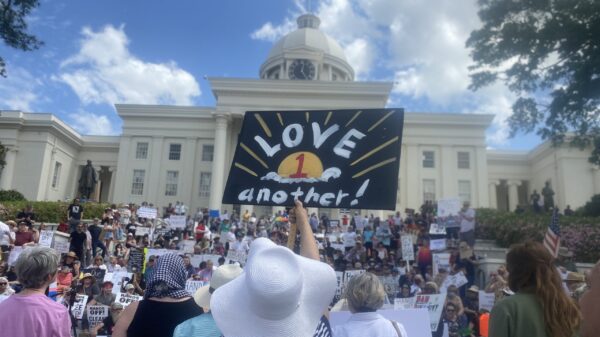Archbishop Roberto González, the Secretary General of the Puerto Rico Bible Society Reverend Heriberto Martínez and the island’s Catholic Charities head, Reverend Enrique Camacho, released a statement Friday calling for pension guarantees, debt relief and disaster assistance for the island on Friday.
“This week, as the oversight board met and workers voted on new pension proposals, we appreciate that the oversight board kept the promise to protect the pensions,” the three said in a statement. “We stand with labor leaders in urging the passage of pension plans that protect the vulnerable and protect the pensions of most of our people.”
González, Martínez and Camacho announced their position in a statement at a press conference in the Cathedral of San Juan Bautista. This is one of the oldest cathedrals in the hemisphere.
The head of the religious development group Jubilee USA, Eric LeCompte, joined the San Juan press conference along with Catholic, United Church of Christ, Lutheran and Disciple religious leaders from the United States.
“For the first time in any debt restructuring for a U.S. city, territory or country, we are seeing pensions being protected,” noted Jubilee USA director and United Nations debt expert, Eric LeCompte. “While we are extremely pleased by the pension proposals, we also must see Puerto Rico’s debt cut by at least 80 percent.”
Puerto Rico is a U.S. territory. They have $72 billion in debt and are struggling to recover from the 2017 Hurricanes Irma and Maria. The major Puerto Rico religious leaders assert their ability to resolve disaster and debt crises are hampered by their relationship with the United States.
“Our ability for resiliency, recovery and resolving our own challenges is tied to our political and colonial status. We call on our people and our officials to begin a new and creative dialogue to resolve our political status,” asserted González, Martínez and Camacho in their statement.
Since 2015, with the support and advice of the religious Jubilee USA Network, we called on decision makers, our people and the faithful to work toward a Jubilee for Puerto Rico.
“In the face of a debt crisis and a 60 percent child poverty rate, we called for debt relief, stopping austerity policies, protecting public pensions and reducing child poverty on our island,” Gonzalez, Martinez and Camacho wrote. “We’ve been concerned about corruption in our own government. Congress made a promise that in exchange for debt relief and a ‘super bankruptcy process,’ a fiscal oversight board would be imposed on Puerto Rico.”
“After Congress passed emergency debt relief legislation in 2016, we felt debt relief was in sight,” the three wrote. “Early plans created by Puerto Rico’s oversight board saw debt payments cut by 80 percent. Congress passed protections for the pensions and the official audit process. Congress began to move forward measures to reduce child poverty. We hoped that the promises made to our people would be kept.”
“Sadly, in the fall of 2017 when Hurricanes Maria and Irma ravaged our island, our hopes for debt relief and child poverty reduction became additional victims of the hurricanes,” González, Martínez and Camacho continued. “Because of rosy economic growth projections from potential federal aid and construction monies, the oversight board negotiated to pay more debt. While there were some innovations in PREPA and COFINA debt proposals, they fell short in delivering enough debt relief — they fell short in the promise of a Jubilee.”
They said if there is failure to provide the island with enough debt relief, “the cost is paid by our people — especially by our children.”
They stated that Congress has failed to pass all of their recommendations to reduce child poverty, but did acknowledge that President Donald Trump last week signed a bill to deliver more than $50 billion for recovery and called on congress and the White House to continue this effort and deliver the additional $70 billion that’s still needed to recover.
“Because of the work of noted economists and our partners at Jubilee USA, we know we cannot risk an overall debt cut of less than 80 percent,” González, Martínez and Camacho said.
The United States invaded and seized Puerto Rico from Spain in 1898 during the Spanish American War. All Puerto Ricans are U.S. citizens by birth.
The current population of the island is 3,177,000, which is down considerably from 2010, when 3,722,000 still lived on the island. The high unemployment, poverty and crippling debt crisis had already begun an exodus from the island. The hurricanes have hastened that process.





















































